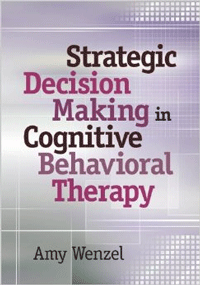“Strategic Decision Making in Cognitive Behavioral Therapy”

“Strategic Decision Making in Cognitive Behavioral Therapy”
By Amy Wenzel
American Psychological Association
Washington, D.C., 2013
Applications of CBT examined
Reviewed by James K. Luiselli, Ed.D., ABPP, BCBA-D
Cognitive behavioral therapy (CBT) is an evidenced-based treatment that has been researched and written about for more than 30 years. So, why another book on CBT? As psychologist Amy Wenzel explains, “There needs to be a middle step that translates the procedures, strategies and techniques described in many CBT texts and treatment manuals” into actual in-session application. “Strategic Decision Making in Cognitive Behavioral Therapy” is just the book to meet this need.
Wenzel defines strategic decision making as the process by which a therapist recognizes critical points during a session or course of treatment, at which time choices must be made about clinical priorities, the effects of therapeutic intervention, how a client perceives therapy and handling crisis events should they arise.
Strategy, in the author’s words, means that CBT should be implemented “conversationally and flexibly, in a manner that balances real-time interaction between the therapist and patient with a productive focus in session and a thread that runs across sessions.”
Part I of the book covers common CBT methodology, starting with case conceptualization, treatment planning, structuring sessions, psychoeducation, and motivational enhancement. Chapters then move into popular CBT techniques such as cognitive restructuring, behavioral activation, problem solving and exposure. Wenzel describes these and other techniques accurately but her main objective is to illustrate the more subtle steps of strategic decision making, which she accomplishes through case vignettes, excerpts of therapeutic dialogue and decision-point analyses.
In Part II, the book concentrates on clinical applications of CBT for depression, anxiety and serious mental illness. These chapters begin with a case description, followed by detailed decision trees that integrate various time points in the process of implementing CBT with a fictitious client. Through instructive “give-and-take” exchanges, readers are encouraged to consider multiple options when thinking about each case and deriving therapeutic solutions.
The underlying and convincing thesis of the book is that when applying CBT, “in most instances there is no one right decision that the therapist should make.” Rather, the key to successful treatment is knowing how to approach behavioral cognitive, and emotional processes with clients as they evolve and through formative action plans that rely on precise case formulation, collaborative interactions, problem solving inquiry and continuous evaluative monitoring.
Procedural fidelity, and not simply knowledge about CBT techniques, is at the heart of this book. That is, therapists must be cognizant about their interpersonal effectiveness with clients and the impact intervention has on building a therapeutic relationship. The book’s empirically grounded approach to clinical practice certainly points professionals in the right direction.
This book is ideal for seasoned CBT professionals wishing to refine their skills and grasp the “principles of strategy” orientation that is presented so precisely. Wenzel warns that the book is not a procedural manual and accordingly, it may initially be daunting for students and therapists just learning the basics of CBT. However, regardless of level of expertise, I believe that therapists will be stimulated by her ideas and recommendations. Clearly, the book offers a compelling rationale and strong evidence for the concepts and practice of strategic decision making when implementing cognitive behavioral therapy.
James K. Luiselli, Ed.D., ABPP, BCBA-D, is senior vice president, applied research, clinical training and peer review at the May Institute in Norwood, Mass.
Learn more about the book: Strategic Decision Making in Cognitive Behavioral Therapy
